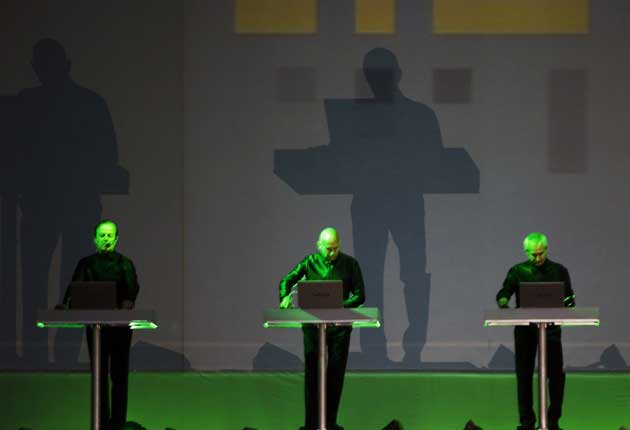Kraftwerk, Velodrome, Manchester
Stars of the track still looking good

Your support helps us to tell the story
From reproductive rights to climate change to Big Tech, The Independent is on the ground when the story is developing. Whether it's investigating the financials of Elon Musk's pro-Trump PAC or producing our latest documentary, 'The A Word', which shines a light on the American women fighting for reproductive rights, we know how important it is to parse out the facts from the messaging.
At such a critical moment in US history, we need reporters on the ground. Your donation allows us to keep sending journalists to speak to both sides of the story.
The Independent is trusted by Americans across the entire political spectrum. And unlike many other quality news outlets, we choose not to lock Americans out of our reporting and analysis with paywalls. We believe quality journalism should be available to everyone, paid for by those who can afford it.
Your support makes all the difference.The sweltering heat and permanently swishing fans in the clammy hands of an ever moistening crowd made it feel more like the suffocating cauldron of the Plaza de Toros rather than the Manchester Velodorome. This suitably futuristic setting for Kraftwerk's only UK indoor concert this year was a typically brave and exciting choice to mark the first night of the Manchester International Festival. But if there were fears that the prevailing conditions could unbalance the kind of cold-blooded and rational appreciation required of this, perhaps the most revered of all groups still plying their wares on the global concert circuit, it was not to be.
Naturally, everyone among the sell-out crowd was wondering exactly what use the famously non-charismatic Germans – who pride themselves on their uber-rational disengagement from their audience – would make of their surroundings. Apart from their only UK No 1, "The Model", "Tour de France" ranks as perhaps their most recognisable track. Ralf Hütter, the only surviving member of the original 1970 Krautrock line-up, has a famous obsession with cycling and is said to own 10 bikes which he used to take on tour (before a recent heart attack) so that he could cover the last 100 miles before each venue on two wheels. So it was to a vast cheer that, in heavily accented English, he introduced Team GB's Olympic cycling heroes to weave their way round the high banks of the Velodrome for the duration of the electropop classic. Cycling, of course, is the perfect expression of the Kraftwerk credo – man and machine working in effortless efficiency, gliding through time and space.
For the following track, "Autobahn", the feast of sound and vision continued. Archive footage taken from motoring's golden age provided the perfect augmentation to the rasping synths and grinding swoops of horns and revving engines that built to a compelling climax. So too for "Trans-Europe Express", where a Kling Klang Musik film depicted trains speeding through imaginary landscapes, giving way to close ups of coupling locos and pumping pistons to accompany the grinding machine noise of the finale.
Having cruised through remixes of their main hits in the first half – "Man-Machine", "Showroom Dummies", "The Model" and "The Robots" (performed to great effect with the band replaced by automata) – they returned after a short interval wearing fluorescent suits for a second half in glorious 3D. The old technology has come a long way since Creature from the Black Lagoon failed to terrify audiences in the 1950s. But if the 3D glasses seemed a touch kitsch, they brought an extra dimension to the night's entertainment: pills and potions fizzed in front of our eyes during "Vitamin" and floating wind-flow diagrams during the chest-crushing bass and crackling static of "Aero Dynamik".
"Radioactivity", a warning about the dangers of nuclear power from 1975, seemed as relevant as it did three decades ago. The finale, "Music Non Stop", was proof (if it were needed) that Hütter and former collaborator Florian Schneider not only predicted, but probably created the dance music phenomenon of the late 80s and 90s long before ecstasy re-wired the brains of that generation.
The US avant garde composer Steve Reich's specially commissioned composition, "2x5", performed by Bang on a Can All-Stars, opened proceedings. While this helped the festival fulfil its remit to pioneer new works, it felt a little lost within the surroundings – at least for those at the back of the auditorium, which was a shame. But the crowds had come for Kraftwerk, whose vision of a world of ultra-fast transport links and mighty computers remains as powerful, prescient and passionate today as it did in the pre-digital, pre-internet world of the 1970s.
Join our commenting forum
Join thought-provoking conversations, follow other Independent readers and see their replies
Comments